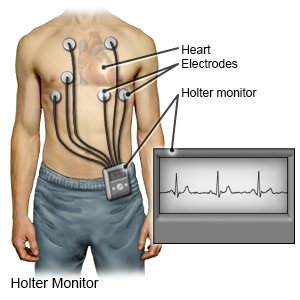Holter Monitor
Medically reviewed by Drugs.com. Last updated on Aug 4, 2025.
What do I need to know about a Holter monitor?
- A Holter monitor is small battery-operated device about the size of a small camera. It is also called a portable, or ambulatory, EKG. A Holter monitor measures and records your heart's rate and rhythm over a period of time. A Holter monitor will show how fast your heart beats and if it beats in a regular pattern.
- Heart symptoms and abnormal heart rhythms may not happen during a regular EKG. A Holter is worn for a longer period while you do your usual daily activities. A Holter monitor is usually worn for 24 to 48 hours. You may need to wear it for up to 3 weeks or more.
- The monitor is small and is not painful. The device has wires that attach to small patches, called electrodes on your chest. The electrodes are usually about the size of a quarter. The results of a Holter monitor will help your healthcare provider diagnose or treat a heart condition.

Why might I need a Holter monitor?
- You have a slow, fast, or irregular heart beat.
- You start new heart medicines or your provider needs to determine if your medicines are working correctly.
- You have a pacemaker and your provider wants to make sure it is working correctly.
- You had an abnormal EKG result.
- You had a heart attack.
- You are scheduled for heart surgery.
Related medications
How do I wear a Holter monitor?
- Sticky pads are placed on certain areas of your chest. The area may need to be shaved. You may need 3, 5, 7, or 12 sticky pads. Your healthcare provider may tape the electrodes to your skin to keep them in place. You may have some skin irritation or a rash where the electrodes are placed. Tell your healthcare provider if you are allergic to any type of adhesive or tape.
- The electrodes will be plugged into the monitor. The monitor will be turned on and will record electrical signals continuously. The monitor will be put in a pouch for you to carry. Wear loose-fitting clothes with your monitor so you can move freely.
What else do I need to know about wearing the Holter monitor?
- Keep a log of your symptoms while you wear the monitor. Write down the time and what you were doing when the symptoms started. List when you take any medicines or drink any alcohol. Take this log with you when you see your healthcare provider. The log may help him or her learn what is causing your abnormal heart activity. The following are some examples of symptoms to write down in the log:
- Chest pain or discomfort
- Dizziness or fainting
- Irregular heartbeats, such as a fluttery feeling in your chest
- Shortness of breath or trouble breathing
- Strong, pounding heartbeats
- Do not get your chest wet. Your sticky pads may fall off if they get wet. The monitor cannot record your heart rhythm without the sticky pads and electrodes in place. The monitor may stop working if it gets wet. Do not shower, take a bath, or swim while wearing the device. Take a sponge bath instead.
- Do not get an x-ray while you are wearing the monitor. Stay away from metal detectors or large magnets, such as an MRI machine. Do not use an electric blanket. These devices may interfere with the monitor.
- Return the Holter monitor to your provider as directed. Your provider will process the information from the monitor and the notes from your log. He or she will contact you with the results.
When should I call my doctor?
- The Holter monitor or wires get wet.
- The sticky pads or electrodes come off your chest.
- Your monitor stops working.
- You have a headache, dizziness, or feel like you are going to faint.
- You have questions or concerns about your condition or care.
Care Agreement
You have the right to help plan your care. Learn about your health condition and how it may be treated. Discuss treatment options with your healthcare providers to decide what care you want to receive. You always have the right to refuse treatment. The above information is an educational aid only. It is not intended as medical advice for individual conditions or treatments. Talk to your doctor, nurse or pharmacist before following any medical regimen to see if it is safe and effective for you.© Copyright Merative 2025 Information is for End User's use only and may not be sold, redistributed or otherwise used for commercial purposes.
Further information
Always consult your healthcare provider to ensure the information displayed on this page applies to your personal circumstances.
